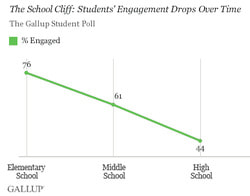 Take a look at the chart to the left from this article: The School Cliff: Student Engagement Drops With Each School Year. However, you want to measure engagement can this be a good trendline? Who would like to argue that if we keep doing more of the same thing, the results for student learning will improve? I think data like this partially explain the rise in the popularity of homeschooling, unschooling, and the newly growing uncollege movement. At some point, we may well see a chart with this same trendline showing a decline in attendance in public and private schools. When we see this chart we will know that finally, some major and positive changes are occurring in education. This prospect will frighten many people at first. But, I think unless we begin to see radical changes taking place in our schools, what goes on outside of school will be more important to the future education of our students. The kinds of changes I have in mind begin with actions like this one: Garfield Teachers Refuse to Give District Required Test. This article recounts the power of teachers acting in concert. While this one act might not lead to anything more positive, more actions like it will. I've argued for years that teachers have immense power to affect change for the better in our schools if only they can find a way to act together. In many cases, teachers know what needs to be done to improve student engagement and learning. They are often prevented from making the positive changes that would lead to better student learning. Without these changes in our schools more and more families will continue to flee from them and many will choose never to enter the system at all. After all, the highest number of the Gallup chart above is 76% engaged. Does that indicate that the prospect of going to school at all costs us 24% of engagement right from the beginning? The challenge for those of us who teach in college is obvious. How do we re-engage students who have been trained for 12 years or more to be unengaged in their learning? I don't have the answer though I'm certainly open to trying I'm not sure a 2 or 4-year experience in college will succeed at this task given how similar the college classroom is to the high school classroom.
0 Comments
Image by Arek Socha from Pixabay
I remember a while back running across an article about the crazy type of interview questions asked by various company's hiring managers. One in particular struck me as an excellent question: "Explain to me what has happened in this country during the last 10 years."
Image by Arek Socha from Pixabay
Brian Eno writes about a paradoxical experience he had in art school which he referred to as the “quadrangle dilemma.” “Returning one day from lunch, the students discovered a notice instructing them to assemble in the school’s courtyard, a quadrangle surrounded on all sides by studio buildings. Once all the students were inside the courtyard the door was locked from the outside by one of the teachers. There was no other exit. Then members of staff began to appear on the roofs above, watching the students from the comfort of chairs:
Image by Gerd Altmann from Pixabay
Suppose you have just graduated with a college degree and are interviewing for a new job. You discover that due to your poor communications and writing skills as well as your lack of general knowledge that you will not be considered for the position. What would you do? Would you
Image by Steve Buissinne from Pixabay
In a recent discussion with a friend, we were talking about doctors who treat patients by just giving out prescriptions and not treating underlying causes. Many doctors do this because that is what patients want. This started me to think about how many areas of life we focus on what we want and ignore what we need. Doctors give patients prescriptions to relieve their symptoms because that's what they want. But, what patients need is for doctors to address the causes of their ailments and treat those. But, doctors are not the only ones. Teachers give students A's because that's what they want. But, students need to be challenged and taught to value lifelong learning. Food manufacturers give customers food loaded with fat, salt, and sugar because that's what they want. But, what we need is healthy real food. Can we blame them for giving us what we want? Only partially. So, you get what you need. So what? You are harming yourselves and others by ignoring what you need. Ask yourself what you really need and focus on that. |
KEVIN J. BROWNEPhilosopher / Educator These blog posts contain links to products on Amazon.com. As an Amazon Associate I earn from qualifying purchases.
Categories
All
Archives
April 2023
|







 RSS Feed
RSS Feed
















